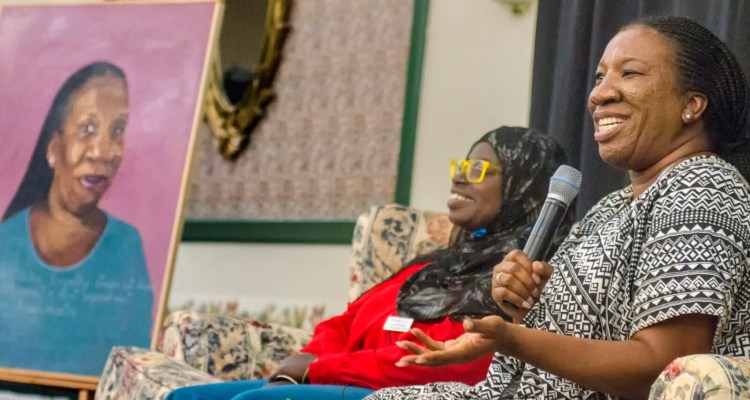AUGUSTA — Many people had never heard of the Me Too movement until Oct. 15, 2017, when it exploded on Twitter with a hashtag after revelations of sexual abuse in Hollywood.
But for 11 years before that and in the years since, the Me Too movement founder and activist Tarana Burke has been working to help those who have experienced sexual abuse and violence, particularly those whose experiences have not been part of the recent discussions — women and girls of color and others who have been pushed out of the mainstream of attention.
On Wednesday, at the fourth Women’s Summit on Economic Security at the Augusta Civic Center, Burke talked about the Me Too movement with Samaa Abdurraqib, community engagement coordinator for the Maine Coalition to End Domestic Violence, in front of a lunchtime audience of more than 300. This year’s summit theme is taking action against sexual assault, harassment and exploitation.
In their hour-long wide-ranging conversation, Burke talked about the importance of changing how people talk about sexual violence.
“Sexual violence is one of the only social justice issues — and it is a social justice issue — that people individualize,” she said.
When a child or someone is shot in a community, people rally around the family and work to get guns out of the community, she said. They’ll say they don’t feel safe in a community where people are being murdered in the street.
“There’s a reaction, a very necessary reaction, to that violence that we don’t see when a person is sexually violated,” Burke said. “When somebody experiences sexual violence, people feel disconnected from it, and you’re left to your own devices to both heal and left to stay in the same community and be vulnerable.”
In the wake of the explosion of awareness of the movement through that one tweet, millions of people have said on social media platforms and elsewhere that they have experienced sexual violence.

Tarana Burke, founder of Me Too and Girls for Gender Equity, speaks Wednesday during the Maine Women’s Summit on Economic Security at the Augusta Civic Center. Kennebec Journal photo by Joe Phelan Buy this Photo
“I can’t imagine that we would not respond to that. If you have 12 million people say I now have a disease, how can we not answer this?” Burke said. “There are three questions I think we would be focused on, and that is: Where did this disease come from, how do we stop it and how do make sure it never happens again? We have not answered those questions in relation to sexual violence.”
At the same time, for people to understand systemic nature of sexual violence, she said, survivors shouldn’t have to be compelled to retell all the details of the violence to bring about change, including legislation.
“I would rather have survivors stand up and talk about the cost of survival,” Burke said. “I want people to understand not that I cry at night and I’m scared of the dark. What I need you to know is that I can’t find a job because I haven’t been dealing with PTSD for 15 years. What I need you to know is that I don’t have a safe place, a safe way for my child to get to school and back without feeling they’re in danger of this violence.
“I need to know how it impacts me as a citizen, as a human being showing up in the world and why I can’t fully function,” she added. “I need you to understand the cost economically, spiritually, mentally, emotionally, physically, the aftermath of the thing.”
Since 2017, the Me Too movement has been adopted by people who want to include wage parity, gender equity and other issues, but Burke said while those issues deserve support, she has remained clear on its purpose in addressing sexual violence. At the same time, she said one of the beautiful things that has happened is that national organizations have started breaking down the walls between their areas of interest.
“There has not been a sustained, national-international movement with high profile around sexual violence in this country,” Burke said. “And we have to have it. If we are not speaking, healing into the lives of the people who are holding this trauma, we’re not doing the right work.”
The summit, hosted by the Maine Women’s Lobby Education Fund, offered sessions on workplace issues, building a harassment-free workplace, storytelling skills, targeting resources to stop trafficking of black, brown and indigenous girls, transgender and sexual violence and addressing harassment in the workplace, understanding institutionalized racism and sexism in Maine, among other issues.
Burke’s connection with Maine goes back decades to when she visited the state as part of the Fresh Air Fund, which makes it possible for children in New York to spend their summers outside the city either with a host family or at a sleep-away camp. She also works with Girls for Gender Equity, which helps young women of color increase their development through programs and classes; and Just Be Inc., which promotes wellness of young females of color.
Send questions/comments to the editors.



Success. Please wait for the page to reload. If the page does not reload within 5 seconds, please refresh the page.
Enter your email and password to access comments.
Hi, to comment on stories you must . This profile is in addition to your subscription and website login.
Already have a commenting profile? .
Invalid username/password.
Please check your email to confirm and complete your registration.
Only subscribers are eligible to post comments. Please subscribe or login first for digital access. Here’s why.
Use the form below to reset your password. When you've submitted your account email, we will send an email with a reset code.